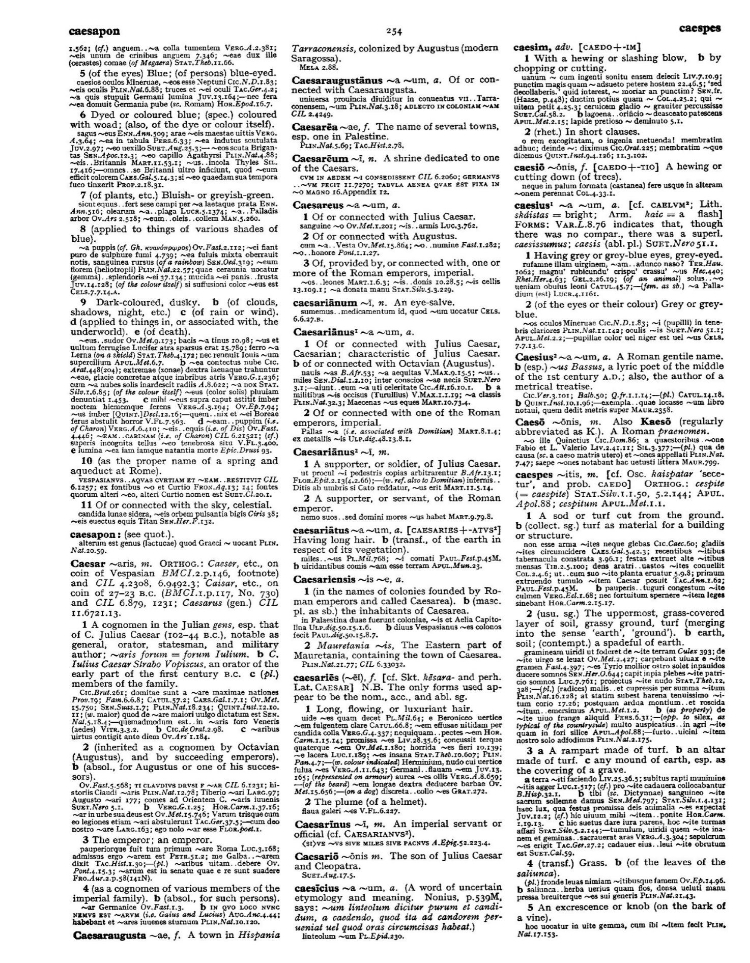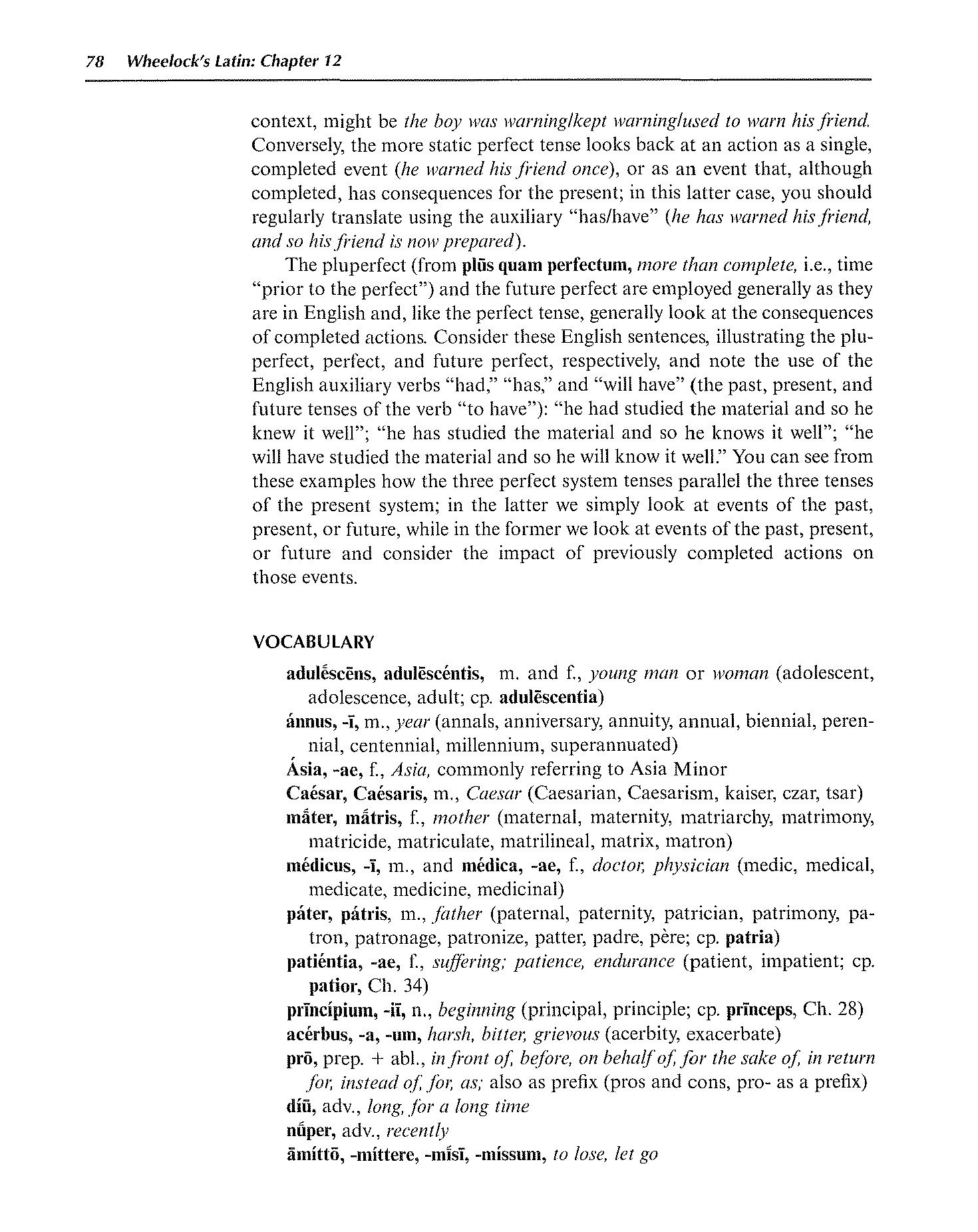
page_listing.tpl
page_subListingDetails.tpl
sub_listingDetails_style1.tpl
sub_listingDetails.title.tpl
Caesar Caesar
Caesar is a Latin Noun that primarily means Caesar.
Definitions for Caesar
Wheelock's Latin
Noun
- 1
Caesar
English derivatives:
Caesarian Caesarism kaiser czar tsar
Oxford Latin Dictionary
Noun
- 1
A cognomen in the Julian gens, esp. that of C. Julius Caesar (102-44 B.C.), notable as general, orator, statesman, and military author. (b) An orator of the early part of the first century B.C. (c) (pl.) members of the family.
- 2
(Inherited as a cognomen by Octavian (Augustus), and by succeeding emperors). (b) (absol., for Augustus or one of his successors).
- 3
The emperor; an emperor.
Sentences with Caesar
Latin to English
Caesar hīs prōdigiīs admonētur.Compare Caesar is warned by these omens.
Caesar in eandem terram vēnerat (vēnit; venit; veniet).Compare Caesar had come (came; is coming; will come) into the same land.
Amīcī Caesaris ipsīus sē servāvērunt.Compare The friends of Caesar himself saved themselves.
Ipsī amīcī Caesaris eum servāvērunt.Compare Caesar's friends themselves saved him.
Caesar tam ācer dux erat ut hostēs mīlitēs Rōmānōs nōn vincerent.Compare Caesar was such a keen leader that the enemy did not conquer the Roman soldiers.
Eā nocte profectus, Caesar ad quandam īnsulam clārissimam vēnit.Compare Having set out that night, Caesar came to a certain very famous island.
Nisi Caesar cīvibus placēbit, vītae eius nōn parcent.Compare If Caesar does not please the citizens, they will not spare his life.
Caesar cūrāvit ut imperium suum maximum in cīvitāte fieret.Compare Caesar took care that his power be made greatest in the state.
Data sources
Notes
- Definitions
- Frederick M. Wheelock, Wheelock's Latin, 6th ed., rev. Richard A. LaFleur (New York, NY: HarperCollins Publishers, 2005): 78.
- P. G. W. Glare, Oxford Latin Dictionary, Vols. 1-8 (Oxford: Clarendon Press, 1982): 254.
- Word frequencies
- Paul B. Diederich, The Frequency of Latin Words and Their Endings, PhD diss., (Columbia University, 1939).
Bibliography
Allen, Joseph H. Allen and Greenough's New Latin Grammar for Schools and Colleges: Founded on Comparative Grammar. Edited by James B. Greenough, George L. Kittredge, Albert A. Howard, and Benjamin L. D'Ooge. Boston, MA: Ginn & Company, 1903.
Crystal, David. A Dictionary of Linguistics and Phonetics. 6th ed. Oxford, UK: Blackwell Publishing, 2008.
Delatte, Louis, Suzanne Govaerts, Joseph Denooz, and Etienne Evrard. Dictionnaire fréquentiel et index inverse de la langue latine [Frequency Dictionary and Inverse Index of the Latin Language]. Liège, Belgium: Laboratoire d'analyse statistique des langues anciennes de l'Université de Liège (L.A.S.L.A.), 1981.
Diederich, Paul B. The Frequency of Latin Words and Their Endings. PhD diss., Columbia University, 1939.
Francese, Christopher. "Latin Core Vocabulary." Dickinson College Commentaries. Last modified 2014. http://dcc.dickinson.edu/latin-vocabulary-list.
Gildersleeve, Basil L., and Gonzales Lodge. Gildersleeve's Latin Grammar: Third Edition, Revised, and Enlarged. 3rd ed. London, England: Macmillan and Co., 1903.
Glare, Peter G.W. Oxford Latin Dictionary. Vols. 1-8. Oxford, England: Clarendon Press, 1982.
Krüger, Bernd. "Latin Conjugation Tables." Cactus2000. Accessed May 5, 2023. https://latin.cactus2000.de/index.en.php.
Pierson, Nick. "Sound of Text." Accessed October 26, 2019. https://soundoftext.com.
Wheelock, Frederick M. Wheelock's Latin. 6th ed. Revised by Richard A. LaFleur. New York, NY: HarperCollins Publishers, 2005.
Wiktionary Contributors. "Victionarium." Wikimedia Foundation, Inc. Updated March 18, 2019. https://la.wiktionary.org/wiki/Victionarium:Pagina_prima.
Citation
Chicago (17th ed.)
Allo Contributors. "Caesar, Caesaris (n.) - Latin Word Definition." Allo Latin Dictionary. Last modified . Accessed February 19, 2026. http://ancientlanguages.org/latin/dictionary/caesar-caesaris.
Entry created on . Last updated on .







